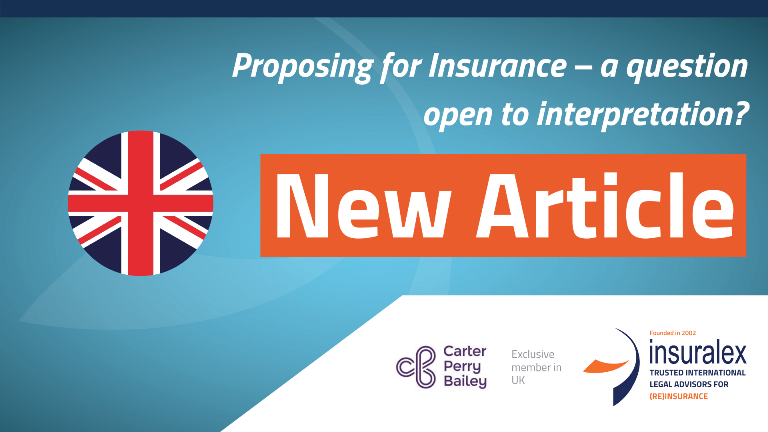
A reminder of when insurers can(not) exercise their entitlement to avoid
The High Court has, in its judgment in Ristorante Ltd t/a Bar Massimo v Zurich Insurance plc [2021] EWHC 2538, restated the principles relating to interpretation of questions in proposal forms, waiver and their impact on insurers’ entitlement to avoid. The decision is a reminder of the importance of clear drafting of questions in proposal forms and the dangers of not updating them in the light of Court decisions.
Background
The insured carried on a restaurant business from a leasehold property. In 2015, the insured took out a multi risk policy with Zurich, which it renewed in 2016 and 2017. In 2018, following a fire at the property, the insured made a claim on the policy. Zurich rejected the claim and purported to avoid the policy for non-disclosure of a material fact.
In 2015, and on each renewal, the insured, via brokers, completed an application on Zurich’s electronic automated underwriting system.
The proposal form required the insured to confirm that:-
”No owner, director, business partner or family member involved with the business:
(i) has ever had a proposal or renewal for insurance declined or cancelled; a policy voided, withdrawn or suspended, or special terms imposed by any insurer.
(ii) has ever been convicted of, or charged (but not yet tried) with any criminal offence, other than motoring offences or offences that are spent under the Rehabilitation of Offenders Act 1974.
(iii) has ever been the subject of a winding-up order or company/individual voluntary arrangement with creditors, or been placed into administration, administrative receivership or liquidation (“the insolvency question”).
The insured confirmed that the statements were correct, but did not advise that three of its directors had been directors of other companies that had entered voluntary liquidation and been dissolved.
Zurich argued that this amounted to a material non-disclosure by the insured and avoided the policy.
The insured argued that it had answered the insolvency question correctly, as it had been concerned with the disclosure of insolvency events of individuals, and not any other company with whom the individuals had been connected.
Further, that in asking a question relating to insolvency, the insured argued that Zurich had waived its right to any further information about the insolvency of any connected companies.
The insured accepted that, subject to the interpretation of the insolvency question and waiver, the liquidation of other companies connected to the directors were material facts that normally ought to be disclosed.
The Decision
Interpretation of the insolvency question
Mr Justice Snowden, upholding the insured’s arguments, reviewed the general principles of contractual interpretation, as they apply to insurance contracts, as set out in Wood v Capita Insurance Services [2017] UKSC 24.
The starting point is that the Court must find the objective meaning (not the subjective intention or understanding of the parties) of the contractual language that the parties have used, considering the contract as a whole.
If there is genuine doubt or ambiguity, then the Court is entitled to prefer the meaning that most accords with business common sense.
However, where there are ambiguous questions posed by insurers, and where there are two objectively reasonable constructions, this should be resolved contra proferentum in favour of an insured.
The Court held that the literal meaning of the clause was as contended for by the insured and that had there been any ambiguity it would have preferred the insured’s interpretation. In summary, the Court held that:
- The critical introductory words to the question (“No owner, director…”) defined the subjects of the enquiry for the questions that followed, including the insolvency question. There is no reference to any corporate entity and as such, the literal meaning favoured the insured.
- It is clear (as was accepted by Zurich) that the earlier questions at (i) and (ii) did not require answers beyond the individual directors/owners of the insured. On this basis, it was unlikely that the parties would have intended the introductory words to have a different meaning for each of the questions.
- Zurich’s argument that the directors/owners had themselves “been the subject of” an insolvency process in their capacity as the directors of now-insolvent companies was neither grammatically or legally sensible. The Court noted that individuals cannot be the subject of a winding up order or placed in a corporate voluntary arrangement.
- The fallacy of Zurich’s interpretation could be seen in that it would be difficult to apply in practice, in particular what level of ownership of an insolvent company would be required before a director/owner would have to answer the question with “Disagree”.
- Insurers can be taken to know about the relevant case law and it is for them to revise the wording of their questions in light of such case law. In making this remark, the Court referenced the decision in R & R Developments v Axa Insurance UK plc 2 All EW (Comm) 527, handed down in 2010, and where the Court held that a similarly worded insolvency question did not extend to companies in which the directors had previously had an interest.
Waiver
Having found in favour of the insured, the Court then considered whether Zurich had, by asking the insolvency question, waived its entitlement to be informed of the earlier corporate insolvencies, or whether the insured’s failure to disclose amounted to an unfair presentation.
The Court endorsed the following passage in MacGillivray on Insurance Law when considering waiver:
“It is more likely, however, that the questions asked [by insurers] “will limit the duty of disclosure, in that, if questions are asked on particular subjects and the answers given to them are warranted, it may be inferred that the insurer has waived his right to information, either on the same matters but outside the scope of the questions, or on matters kindred the subject-matter of the questions … If an insurer asks whether individual proposers have ever been declared bankrupt, he waives disclosure of the insolvency of companies of which they have been directors.””
Adopting this approach the Court held that there had been a waiver, the insured had not made an unfair presentation, and Zurich was not entitled to avoid the policy. The Court held:
- The question to be asked was whether a reasonable person reading the insolvency question would be justified in thinking that the insurer had restricted its right to receive all material information.
- Having identified previous liquidations as a subject matter on which Zurich required disclosure, and specified the persons to whom the question applied, Zurich had restricted its right to disclosure in respect of other persons or companies.
- It was therefore reasonable for the insured to infer that Zurich did not want to know about the earlier corporate liquidations.
- Express and repeated warnings elsewhere in the proposal form to disclose every material fact were not sufficient in this case to overcome the waiver arising from the language of the question.
- This conclusion was consistent with the Court’s decisions in Doheny v New India Assurance Co [2005] 1 All ER (Comm) 382 (CA) and R & R Developments, on similar facts.
CPB Comment
Clearly insurers will want to know about moral hazards such as personal insolvencies and indeed those of companies where there are common directors (indeed, it was accepted that this was a material matter) and on that premise the decision may be seen as surprising. It is certainly unhelpful for insurers generally.
The decision is a reminder that insurers should pay close attention both to the way they draft and present questions on proposal forms.
It would have been a straightforward exercise to amend the wording of the insolvency question and present it as a standalone question to ensure it covered insurers’ requirements.
Finally, insurers should take stock of and regularly review both their proposal forms and policy wordings to take account of any case-law developments. The Court noted that by 2015, Zurich had had more than enough time following the Court’s decisions in Doheny and R & R Developments to review and amend the questions to ensure they received the required disclosure from applicants.
October 2021
Any questions
If you have any questions regarding the insurance-related issues highlighted in this article, please get in touch with Mark or Dean.
You can also review a range of articles on similar insurance and reinsurance topics in the Publications section of our website.
Mark Aizlewood
Partner
T: 0203 697 1908
M: 007469 852 355
Dean De Cesare
Senior Associate
T: 0203 697 1912
M: 007425 355252
This information has been prepared by Carter Perry Bailey LLP as a general guide only and does not constitute advice on any s pecific matter. We recommend that you seek professional advice before taking action. No liability can be accepted by us for any action taken or not as a result of this information, Carter Perry Bailey LLP is a limited liability partnership registered in England and Wales, registered number OC344698 and is authorised and regulated by the Solicitors Regulation Authority. A list of members is available for inspection at the registered office 10 Lloyd’s Avenue, London, EC3N 3AJ.





